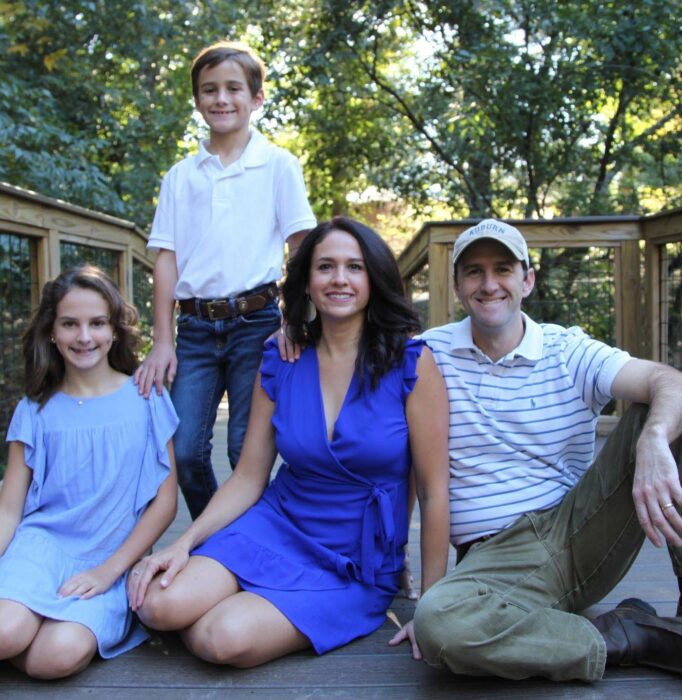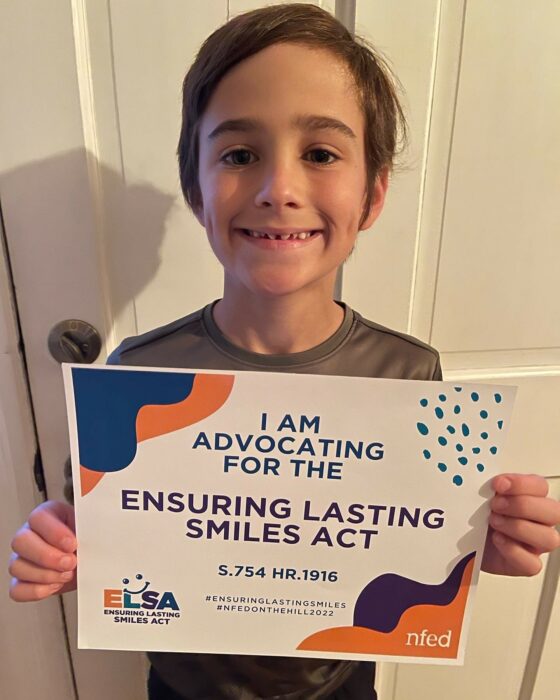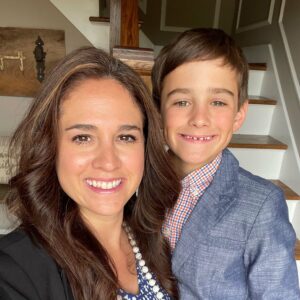This month’s Volunteer Spotlight features the Rigsby family! Morgan and her son, Carter, are passionate advocates for the Ensuring Lasting Smiles Act (ELSA). We are grateful to them for taking time each month to communicate with the legislators and to affect change!
My name is Morgan Rigsby, and I live with my family in Auburn, Alabama. My husband, Casey, and I have two children, Mary Lyle and Carter. Some of our favorite things to do as a family are going to the lake to waterski, visiting and working on my parents’ farm, and having family board game nights.

Carter was diagnosed with hypohidrotic ectodermal dysplasia (HED) several years ago. Of the symptoms of this disorder, the main ones Carter presents are skin irritations, eczema, abnormal sweat patterns (a major issue in the heat and humidity in Alabama) and, most prevalent, he is missing approximately 12 – 13 permanent teeth.
Heeding the Call
Upon his diagnosis, I got involved with the National Foundation for Ectodermal Dysplasias (NFED). For me, becoming an advocate was extremely important so that my kids would see me modeling the behavior I would like them to have, which is taking action on things you believe in. Carter and I felt a calling to become involved in the fight to right the wrong that insurance companies have done. The NFED was the foundation I needed to help me get started in my advocacy journey.
After signing up to become an advocate, I wanted to hit the ground running! I visited the websites of each of my legislators and immediately sent them an email requesting to schedule a meeting to discuss ELSA, which will help ensure families affected by congenital anomalies receive the care and procedures needed to gain normal bodily functions.
The Most Effective Strategy
Next, I posted our story on my personal social media pages. I specifically asked friends and family to assist me in making personal connections and/or scheduling meetings with the representatives in their respective districts. My inbox was immediately flooded with responses and offers of help in numerous ways!
Social media was, by far, the most effective way of getting a large response in a very small amount of time. I had to make myself vulnerable to do this, but it was the best decision I have made on this journey!
I cannot emphasize enough how vital the individual connections have been to us. Within the first two weeks following the post, I was able to schedule meetings with three congressmen. In these meetings, two of the three committed to becoming a co-sponsor, and both followed through with that promise! In addition, I was able to get a connection to one of our senators’ Chief of Staff. He met with me along with one of their health care staffers. I know everyone’s path is different with advocacy, but this is what worked for us.
After I had established the relationships within the representatives’ offices, it has been easy to send email updates when any changes occur with the bill. Consistent—but not too much—communication has been key for us. I was able to participate in the NFED’s Advocacy Day on Capitol Hill this past March, and I will also be participating in the Advocacy Day with the Senate on June 21.
Celebrate the Small Victories

One of the most powerful moments I have had while volunteering for the NFED has been watching the vote in Congress with Carter. He is only nine, and it is difficult for him to grasp the achievement, but he was still overjoyed at knowing we played even a small part in this milestone, especially after he participated with me in Advocacy Day.
Another powerful moment was a phone call with one of our senators’ staffers, who ironically, was missing numerous teeth as a child (he was never diagnosed with any underlying cause). He told me how enlightening our conversation had been because he had not ever heard such honest conversation from the parent’s perspective. It was very touching for us to share each of our unique experiences and for Carter to make a connection to someone that has been through a lot of the treatments he will face.
One of the most challenging aspects of being an advocate and volunteer has been tempering my expectations. I have had to learn patience and to trust the process. In today’s world, we expect immediate gratification, and unfortunately, legislative changes take a lot of effort and time. As a family, we are intentional about celebrating the small wins to stay motivated.
It Takes an Army
Volunteering for the NFED has taught me to ask for help. Advocacy is not something we are meant to do on our own. Our families, friends, neighbors and even acquaintances can all be of assistance. You never know who has had a similar path or who may know somebody that can help push your initiative to the top.
Being open with your story and needs is imperative! So many people have sent letters on our behalf, and I know it is making a difference to support the meetings I am having with each representative.
On days that I feel helpless watching Carter deal with this disorder, I know that at least I am helping to champion this cause.
Ultimately, I have learned that no matter what you are facing, people are willing to support you. The kindnesses we have been shown have blown us away. In turn, I have been able to connect with several others who are facing similar situations and it has been very rewarding to help those that are early in their diagnosis. A strong support system is critical to any good fight, and we have been extremely fortunate to have this connection with the NFED community!
My Best Tips
Here are the steps I would recommend taking:
- Do your homework! Find out what committees your senators sit on. If any are on the Health, Education, Labor & Pensions (H.E.L.P.) committee, reach out to them first. ELSA originated in this committee, so their support will hold more weight.
- Send an email requesting a meeting.
- Hold a meeting with the senator and directly ask for their support—a call to action at the end of the meeting is necessary!
- Follow up anytime there is a change with the bill. Examples are more co-sponsors being added, a schedule of votes or any other necessary information.
- Be consistent but do not over-communicative. Both Senate offices have told me to communicate often so that the bill stays at the forefront of their mind, but not so much that you become a nuisance. Remember, they see a lot of pieces of legislation so reminding them of your story each time may be helpful.
- Tell your story!
With the U.S. House of Representatives having passed ELSA, we now need every voice to get the Senate to do the same. It is never too late to get involved and every voice helps!
Sign Up for Advocacy Day with the Senate
